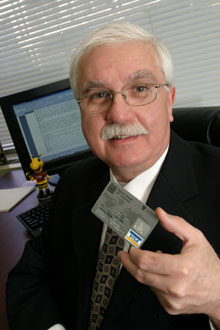Corporate credit card saves university money

Rod Parsons with the corporate card
Photo by Andrew Dobrowolskyj
The Royal Bank Visa corporate credit card program introduced two years ago has been successful beyond expectations, according to Rod Parsons, manager of Accounts Payable, but it still has room to grow.
The program was introduced to simplify the acquisition, receipt and payment of low-dollar-value purchases and travel expenses.
“To date, Royal Bank Canada has issued 287 Visa cards under the program for Concordia University, and we had done $4.5 million in transactions by the end of December,” Parsons said in an interview.
“The service departments of the university are pretty much saturated, but I am still selling this financial tool to our faculties.” The value of the program to the university is real. It costs $40 to $60 to cut a cheque and $10 to process a direct deposit transaction. Neither is necessary when the card is used to purchase items of less than $1,000 Canadian as well as travel and entertainment.
Also, since it takes the university about 30 days to complete the approval and payment process for transactions incurred via the card, the money is available to the university until the bill is paid.
“No employee should be out of pocket for a work-related expense,” Parsons said firmly.
For years, employees have used their own credit cards or requested cash advances to pay for hotel rooms or airline tickets for conferences; or they have used travel vouchers to buy airline tickets from one of the university’s designated travel agencies.
“Now all they have to do is have the trip approved, call and book their travel arrangements from one of the travel agencies, and pay using their corporate Visa credit card. One-stop shopping.”
When they used their personal credit cards, they had to pay their credit card bill, and then initiate and wait for reimbursement by the university.
Under this system, the employee uses the Concordia Visa credit card, and when the bill comes in, he or she sends it to Accounts Payable with an itemized, approved expense report and all the original receipts.
If any of the items on the corporate credit card bill were personal, the employee adds a personal cheque payable to US Bank Canada Inc, the administrator of the program for Royal Bank Canada.
The holder of the card signs a form acknowledging his or her responsibilities. The cardholder is responsible for securing reasonable prices on behalf of Concordia University, reporting a lost or stolen card.
As well, the cardholder must abide by all the policies and procedures governing the use of the card. This includes keeping the card safe. Obviously, the card must be used for work-related expenses. Parsons said he has not encountered any problems on that score in the two years the program has been operating.
As for the future of the program, as of January 2004, all holders of corporate credit card can view their transactions on the Web. For more information, please contact parsons at parsons@alcor.concordia.ca.
He is looking at bringing frequent vendors into the program, such as Canada Post, and he wants to find an efficient way to communicate with cardholders so that they can be reminded, for example, when they are approaching their credit limit. He can see the potential for a website for the program.
“We’re moving toward a cashless environment. It’s new thinking versus old thinking.Plastic is the way of the future when it comes to financial payments.”
For now, our credit card looks just like an ordinary Visa credit card, but Parsons said that one of these days a snazzy picture of a Concordia building could appear on it.”
More information about the program is available at web2.concordia.ca/Treasury/new/index.html.